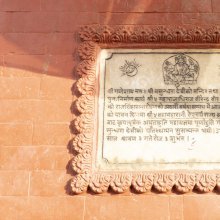Adhiraja, Adhirāja: 13 definitions
Introduction:
Adhiraja means something in Hinduism, Sanskrit, Buddhism, Pali, the history of ancient India, Hindi. If you want to know the exact meaning, history, etymology or English translation of this term then check out the descriptions on this page. Add your comment or reference to a book if you want to contribute to this summary article.
Images (photo gallery)
In Hinduism
Purana and Itihasa (epic history)
Source: Cologne Digital Sanskrit Dictionaries: The Purana IndexAdhirāja (अधिराज).—In rājasūya, Pṛthu was anointed as.*
- * Brahmāṇḍa-purāṇa III. 8. 25.
Adhirāja (अधिराज) is a name mentioned in the Mahābhārata (cf. II.28.3) and represents one of the many proper names used for people and places. Note: The Mahābhārata (mentioning Adhirāja) is a Sanskrit epic poem consisting of 100,000 ślokas (metrical verses) and is over 2000 years old.

The Purana (पुराण, purāṇas) refers to Sanskrit literature preserving ancient India’s vast cultural history, including historical legends, religious ceremonies, various arts and sciences. The eighteen mahapuranas total over 400,000 shlokas (metrical couplets) and date to at least several centuries BCE.
India history and geography
Source: archive.org: The Geographical Dictionary of Ancient and Mediaeval IndiaAdhirāja.—Same as Karuṣa: the country of Rewa. It was the kingdom of Dantavakra who was killed by Kṛṣṇa in Mathura (Padma-purāṇa., Pātāla, ch. 35). It was conqueredby Sahadeva, one of the five Pāṇḍavas (Mahābhārata, Sabhā Parva., ch. 30).
Source: Cologne Digital Sanskrit Dictionaries: Indian Epigraphical GlossaryAdhirāja.—(IE 8-2), sometimes used as an imperial title, but sometimes as the title of a feudatory. Cf. Adhimahārāja. (BL), title of a subordinate ruler. (LL), designation of a supreme king. Note: adhirāja is defined in the “Indian epigraphical glossary” as it can be found on ancient inscriptions commonly written in Sanskrit, Prakrit or Dravidian languages.

The history of India traces the identification of countries, villages, towns and other regions of India, as well as mythology, zoology, royal dynasties, rulers, tribes, local festivities and traditions and regional languages. Ancient India enjoyed religious freedom and encourages the path of Dharma, a concept common to Buddhism, Hinduism, and Jainism.
Languages of India and abroad
Pali-English dictionary
Source: BuddhaSasana: Concise Pali-English Dictionaryadhirāja : (m.) emperor.

Pali is the language of the Tipiṭaka, which is the sacred canon of Theravāda Buddhism and contains much of the Buddha’s speech. Closeley related to Sanskrit, both languages are used interchangeably between religions.
Sanskrit dictionary
Source: Cologne Digital Sanskrit Dictionaries: Benfey Sanskrit-English DictionaryAdhirāja (अधिराज).—i. e. adhi-rājan, m. A supreme king.
Source: Cologne Digital Sanskrit Dictionaries: Cappeller Sanskrit-English DictionaryAdhirāja (अधिराज).—[masculine] supreme ruler, sovereign.
Source: Cologne Digital Sanskrit Dictionaries: Monier-Williams Sanskrit-English DictionaryAdhirāja (अधिराज):—[=adhi-rāja] [from adhi-rāj] m. an emperor.
Source: Cologne Digital Sanskrit Dictionaries: Goldstücker Sanskrit-English DictionaryAdhirāja (अधिराज):—[tatpurusha compound] m.
(-jaḥ) . The same as the preceding. E. adhi and rājan, samāsānta aff. ṭac.
Source: DDSA: Paia-sadda-mahannavo; a comprehensive Prakrit Hindi dictionary (S)Adhirāja (अधिराज) in the Sanskrit language is related to the Prakrit word: Ahirāya.
[Sanskrit to German]
Sanskrit, also spelled संस्कृतम् (saṃskṛtam), is an ancient language of India commonly seen as the grandmother of the Indo-European language family (even English!). Closely allied with Prakrit and Pali, Sanskrit is more exhaustive in both grammar and terms and has the most extensive collection of literature in the world, greatly surpassing its sister-languages Greek and Latin.
Hindi dictionary
Source: DDSA: A practical Hindi-English dictionaryAdhirāja (अधिराज) [Also spelled adhiraj]:—(nm) a sovereign, supreme ruler.
...
Kannada-English dictionary
Source: Alar: Kannada-English corpusAdhirāja (ಅಧಿರಾಜ):—[noun] a supreme king who possesses sovereign authority, power over several kings; a sovereign king.
Kannada is a Dravidian language (as opposed to the Indo-European language family) mainly spoken in the southwestern region of India.
See also (Relevant definitions)
Starts with: Adhirajakumaar, Adhirajakumara, Adhirajan, Adhirajani, Adhirajaraja, Adhirajata, Adhirajatva.
Ends with (+9): Ajiradhiraja, Bhojadhiraja, Brahm-adhiraja, Dharma-mahadhiraja, Dharma-maharajadhiraja, Dravyagunadhiraja, Garjanaka-adhiraja, Garjanika-adhiraja, Hathayogadhiraja, Jnanadhiraja, Kataka-adhiraja, Kumaradhiraja, Kusumadhiraja, Lankadhiraja, Lanthadhiraja, Lokarakshadhiraja, Mahadhiraja, Maharajadhiraja, Mantradhiraja, Mrigadhiraja.
Full-text (+6): Ahiraya, Adhirajya, Adhiraj, Rajadhiraja, Ajiradhiraja, Cenatirayan, Garjanaka-adhiraja, Garjanika-adhiraja, Curatiracan, Maharajadhiraja, Kataka-adhiraja, Kuntala, Mantradhiraja, Keshabandha, Shailadhiraja, Kusumadhiraja, Adhimaharaja, Hathayogadhirajatika, Mahadhiraja, Mrigadhiraja.
Relevant text
Search found 14 books and stories containing Adhiraja, Adhirāja, Adhi-raja, Adhi-rāja; (plurals include: Adhirajas, Adhirājas, rajas, rājas). You can also click to the full overview containing English textual excerpts. Below are direct links for the most relevant articles:
Manasara (English translation) (by Prasanna Kumar Acharya)
Chapter 42 - The royal orders and insignia (rāja-lakṣaṇa)
Chapter 49 - The crowns (mauli) and coronation (abhiṣeka)
Rig Veda (translation and commentary) (by H. H. Wilson)
Rig Veda 10.128.9 < [Sukta 128]
Chaitanya Bhagavata (by Bhumipati Dāsa)
Verse 2.23.502 < [Chapter 23 - Wandering about Navadvīpa On the Day the Lord Delivered the Kazi]
Verse 2.11.96 < [Chapter 11 - The Characteristics of Nityānanda]
Puranic encyclopaedia (by Vettam Mani)
List of Mahabharata people and places (by Laxman Burdak)
Historical Elements in the Matsya Purana (by Chaitali Kadia)
The State and organizations of Kingdoms < [Chapter 5 - Cultural history in the Matsya-Purāṇa]

